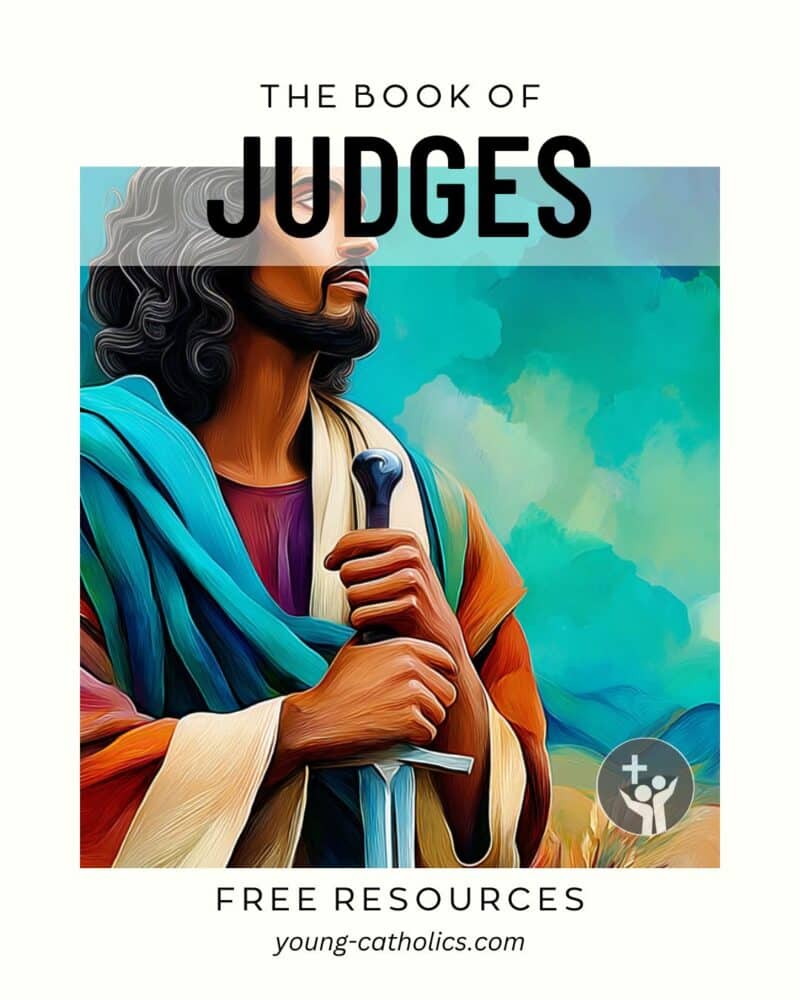Wednesday of the 20th Week in Ordinary Time
Wednesday August 18, 2027

God’s Way Is Different
On Wednesday of the 20th Week in Ordinary Time Cycle 1, we hear stories that make us think about leadership, fairness, and God’s way of doing things. The readings show how people often choose the wrong leaders, judge others too quickly, or expect rewards based on their own rules. But God sees things in a different light.
In the first reading, the trees choose a thornbush to rule over them. It’s a warning about what happens when people look for power instead of wisdom. The Gospel shows workers in a vineyard getting paid the same, even though they worked different hours. This can feel unfair at first, but it teaches us something about God’s generous love.
Psalm 21 reminds us that blessings and joy come from God. A good leader knows this. A faithful person gives thanks, not just for success, but for the help God gives each day.
Wednesday of the 20th Week in Ordinary Time Cycle 1 helps us look at life in a new way. It reminds us that God doesn’t measure worth the way we do. He gives freely and leads with care.
Daily Mass Readings for Wednesday of the 20th Week in Ordinary Time Cycle 1
- First Reading – Judges 9:6-15: Jotham told a parable where trees seek a king, rejecting fruitful trees and choosing the thornbush, warning of poor leadership’s consequences.
- Responsorial Psalm – Psalm 21: The king finds joy in the Lord’s strength and victory. God granted him blessings, honor, and long life, making him a blessing and filling him with joy.
- Gospel – Matthew 20:1-16: The kingdom of heaven is like a landowner who pays all workers equally, regardless of how long they worked. This parable teaches about God’s generosity and fairness, where the last will be first.
Cycle 1 is used in odd numbered years and Cycle 2 is used in even numbered years. The gospel is the same for both years. For even numbered years see Wednesday of the 20th Week in Ordinary Time Cycle 2.
What if I wish to give this last one the same as you? Or am I not free to do as I wish with my own money? Are you envious because I am generous?
Matthew 20:14-15
Themes for the Readings for Wednesday of the 20th Week in Ordinary Time Cycle 1
The readings for Wednesday of the 20th Week in Ordinary Time Cycle 1 highlight lessons on leadership, fairness, and humility. The story of Abimelech in Judges and the parable of the vineyard workers in Matthew offer important insights.
- Unwise Ambition: Abimelech’s desire for power leads to destructive actions. This theme warns against selfish ambition and the consequences of seeking power at any cost.
- Fairness and Justice: The vineyard workers in the Gospel receive the same wage despite working different hours. This theme emphasizes God’s fairness and the importance of justice in our dealings with others.
- Humility in Service: The first workers in the parable complain about their pay. This teaches us to serve humbly without comparing ourselves to others or expecting special treatment.
- God’s Generosity: The landowner’s generosity in the parable shows that God’s ways are not always like human ways. It reminds us that God’s generosity often exceeds our expectations.
- Gratitude: The workers hired last show gratitude for their unexpected wages. This theme encourages us to be grateful for the blessings we receive, even when they come in surprising ways.
- Caution Against Pride: Abimelech’s pride leads to his downfall. This warns us that pride can blind us to wisdom and lead to negative consequences.
The readings for Wednesday of the 20th Week in Ordinary Time Cycle 1 teach us about leadership, fairness, and humility. By reflecting on these themes, we can grow in our understanding of God’s teachings and live more faithfully.
Reflection for Wednesday of the 20th Week in Ordinary Time Cycle 1
On Wednesday of the 20th Week in Ordinary Time Cycle 1, the readings from Judges and Matthew offer valuable lessons on leadership, fairness, and humility. These reflections explore how the stories of Abimelech and the vineyard workers challenge us to think about our actions and attitudes. By understanding these themes, we can grow in our faith and live more fully according to God’s will.
Choosing the Right Leaders
On Wednesday of the 20th Week in Ordinary Time Cycle 1, we hear the parable of the trees from Judges. This story warns against choosing leaders who are not fit for the role. The trees look for a leader among themselves, and each suitable candidate declines, leaving the thornbush, a poor choice, to take charge. This parable teaches us that sometimes, those who should lead decline, while unsuitable people step up and take control.
In our lives, we must be cautious about who we follow and support. Not everyone who seeks leadership does so for the right reasons. The story of the trees reminds us to look for leaders who are genuinely good, wise, and humble. We need to evaluate their motives and actions carefully.
Choosing unworthy leaders can lead to negative consequences. Just as the thornbush offered little protection or benefits, unworthy leaders may fail to guide us well. We should seek leaders who care for the well-being of others and who are honest and just.
As individuals, we also have a responsibility not to push ourselves into positions of power for selfish reasons. We should be willing to step back if we are not the right person for the job. True leadership comes from serving others, not from seeking control.
Understanding God’s Fairness
The readings for Wednesday of the 20th Week in Ordinary Time Cycle 1 highlight a different view of fairness. In the Gospel, the vineyard owner pays all workers the same, regardless of how long they worked. This story shows us that God’s idea of fairness is not about giving everyone the same amount but about meeting each person’s needs.
We often think fairness means equal treatment, but these readings challenge that idea. God’s fairness is about justice and compassion, giving each person what they need, not just what they want. This teaches us to trust that God knows our needs better than we do.
In our lives, we may feel that things are unfair when others seem to get more blessings or rewards. The Gospel story reminds us not to compare ourselves with others but to focus on the gifts we have received. We should be grateful for what we have, recognizing that God provides for us according to our unique circumstances.
It’s important to remember that God’s ways are different from ours. We may not always understand why some get more and others less, but we can trust in God’s wisdom and care for all His children. This perspective helps us to be more content and less envious.
Lastly, we can learn to extend this understanding of fairness to how we treat others. We should aim to be just and compassionate, recognizing that everyone has different needs. By doing so, we reflect God’s love and justice in our own lives.
The Call to Humility
On Wednesday of the 20th Week in Ordinary Time Cycle 1, both the story of Abimelech and the Gospel parable highlight the importance of humility. Abimelech’s story shows the dangers of pride and the harm that comes from seeking power for selfish reasons. In the Gospel, the workers who complain about their pay demonstrate a lack of humility, focusing on what others receive rather than being grateful for their own wages.
Humility is essential in our relationship with God and others. It means recognizing our limitations and being content with what God gives us. We often struggle with comparing ourselves to others, feeling jealous or envious when someone seems to receive more blessings. However, these readings encourage us to focus on our own path and trust that God knows what is best for us.
In our daily lives, practicing humility helps us to be more peaceful and content. Instead of seeking recognition or trying to prove ourselves better than others, we can focus on serving and loving those around us. Humility allows us to appreciate the gifts we have and to be happy for others’ successes without feeling threatened.
Moreover, humility involves acknowledging that we don’t have all the answers. Just as the vineyard workers needed to trust the landowner’s decisions, we need to trust God’s plan for our lives. This means being open to His guidance and accepting His will, even when it doesn’t align with our own desires.
By embracing humility, we become more Christ-like in our actions and attitudes. Jesus Himself was the ultimate example of humility, serving others and sacrificing for our sake. As we reflect on these readings, we are reminded to follow His example and to live with humility, gratitude, and trust in God’s loving care.
As we reflect on the lessons from Wednesday of the 20th Week in Ordinary Time Cycle 1, we are reminded to choose our leaders wisely, understand God’s fairness, and practice humility. These teachings guide us to live with gratitude, trust, and compassion. May we take these lessons to heart and apply them in our daily lives.
Prayer
Lord, help us to choose wise leaders, understand Your justice, and live with humility. May we be grateful for Your blessings and trust in Your plan. Guide us to serve others with love and compassion. Amen.
Reflection Questions
- How do I discern whether a leader is motivated by selfish ambition or genuine care for others?
- In what areas of my life do I struggle with comparing myself to others, and how can I grow in gratitude?
- How do I respond when I feel life is unfair or when others seem to receive more than I do?
- What steps can I take to practice humility in my relationships and daily decisions?
Homilies and Commentaries for Wednesday of the 20th Week in Ordinary Time Cycle 1
It’s Not Fair
In her reflection for Wednesday of the 20th Week in Ordinary Time Cycle 1, Sr. Mary Ellen Green speaks about our tendency to cry out, “It’s not fair.” She notes that life is indeed unequal, especially in how wealth and resources are spread throughout the world. But instead of focusing only on fairness, she invites us to consider mercy. God’s way of justice is not based on strict equality but on mercy that heals and restores.
Sr. Mary Ellen explains that mercy is at the heart of the gospel and is the key to living as Christians. While fairness is often measured by human standards, mercy calls us to a higher standard, one that reflects God’s own way of acting. To live with mercy is to be counter-cultural, choosing compassion over comparison. In God’s kingdom, the last are first, and justice is revealed through merciful love.
God’s Love Is Always Enough
In the parable of the vineyard, workers hired late in the day receive the same wage as those who worked from early morning. At first this seems unfair, but Jesus uses the story to point us to a deeper truth. God’s love and mercy are not earned by effort or time. They are gifts freely given. Nothing we do can make us more deserving, and nothing can make us less worthy. God’s grace is poured out on all who come to Him, no matter when they arrive.
Dr. Sullivan explains that faith is both our response and a gift. It is not something we can claim by right or by merit. God gives it freely, just as the vineyard owner gave full wages to every worker. This is the lesson of Wednesday of the 20th Week in Ordinary Time Cycle 1. We are called to be thankful for the gift of God’s love shared with each one of us.
Reckless Generosity
The parable of the workers in the vineyard reminds us that God’s ways are not like ours. We often measure fairness by what we think people deserve, but Jesus shows us that God’s justice is always joined with mercy and generosity. The landowner paid all the workers the same, not because it was unfair, but because his generosity had no limits. Heaven itself is the gift, and there is no need for more than what God offers.
In his reflection for Wednesday of the 20th Week in Ordinary Time Cycle 1, Matthew Kelly explains that this parable challenges our sense of justice. We may struggle with the idea that someone who turns to God at the last moment receives the same eternal reward as someone faithful for many years. But in heaven, there is no jealousy. Kelly reminds us that God’s generosity is beyond measure, and we are called to celebrate it, not begrudge it.
God’s Generosity Beyond Our Understanding
For Wednesday of the 20th Week in Ordinary Time Cycle 1, Bishop Robert Barron reflects on Jesus’ parable of the landowner who pays all his workers the same, regardless of when they began. From a human perspective, this seems unfair, but it challenges us to see God’s ways through the lens of divine generosity rather than human justice. God’s wisdom and perspective are infinitely greater than ours, and we are called to trust in his providence and mercy even when it feels beyond our understanding.
Bishop Barron reminds us of a dying gangster who was forgiven by a priest, sparking outrage over the seeming unfairness. Yet, as God declares, “My ways are not your ways.” We are invited to let go of our limited sense of justice and embrace awe and trust in God’s grace. This parable calls us to rejoice in God’s boundless mercy and generosity rather than question his decisions.
Resources

The Book of Judges: A Warning from the Trees
The first reading for Wednesday of the 20th Week in Ordinary Time Cycle 1 comes from the Book of Judges, which tells the story of Israel’s early leaders before the time of kings. Jotham’s parable shows how the people often rejected wise, faithful leadership and chose what seemed strong but was truly dangerous.
This short story reflects the book’s larger message: when God’s people forget their covenant and chase after power or false leaders, trouble follows. Judges warns that without God’s guidance, the people fall into disorder. Jotham’s words fit this theme of faithfulness versus corruption.

Psalm 21: Joy in God’s Strength
Psalm 21, used on Wednesday of the 20th Week in Ordinary Time Cycle 1, is a royal psalm, celebrating a king’s trust in God’s help and blessings. It reminds us that true strength and joy come from the Lord, not from earthly power.
This psalm fits into the larger collection as a song of thanksgiving for God’s faithful care over the king and the people. It expresses a theme often seen in the psalms: God blesses those who rely on Him. The king’s joy is really a reflection of God’s favor.

The Gospel of Matthew: God’s Generous Kingdom
The Gospel for Wednesday of the 20th Week in Ordinary Time Cycle 1 comes from Matthew, where Jesus often speaks about the kingdom of heaven using parables. In this story, the landowner pays all his workers the same, whether they came early or late. This challenges human ideas of fairness.
The message connects to Matthew’s wider focus on God’s mercy and the upside-down nature of His kingdom. Salvation is a gift, not something we earn. God welcomes all, even those who come late. This parable invites humility and reminds us that God sees things differently.
Social Media Graphics and Bulletin Artwork
The Thornbush Among the Trees

Looking for a vivid image to reflect the message of Wednesday of the 20th Week in Ordinary Time Cycle 1? This artwork, inspired by Jotham’s parable in Judges, shows the thornbush chosen as king—reminding us to reflect on the leaders we follow.
Download this image now for use in parish bulletins, newsletters, or other ministry resources.
Paid subscribers may download a large copy this digital artwork without watermarks, suitable for use in bulletins, social media, newsletters, etc., free of charge by clicking here. You must be logged in as a paid subscriber to access the file.
Only current paid subscribers have the rights to use the artwork.
Questions and Answers for Wednesday of the 20th Week in Ordinary Time Cycle 1
Why did Abimelech want to be king in the first reading for Wednesday of the 20th Week in Ordinary Time Cycle 1?
Abimelech wanted to be king because he sought power and control. He convinced the people to follow him by promising that he would be a strong leader, but his motives were selfish.
What is the lesson from the story of the trees in Judges 9:8-15?
The story of the trees is a parable that warns against choosing unworthy leaders. This reading for Wednesday of the 20th Week in Ordinary Time Cycle 1 shows that sometimes the least suitable person may end up in charge, leading to trouble.
How does the story of Abimelech in the first reading for Wednesday of the 20th Week in Ordinary Time Cycle 1 relate to our lives today?
The story of Abimelech teaches us about the dangers of seeking power for selfish reasons. In our lives, we should strive for humility and serve others rather than seeking control or dominance.
Why did the landowner pay all the workers the same in the Gospel for Wednesday of the 20th Week in Ordinary Time Cycle 1?
The landowner paid all the workers the same to show that God’s generosity doesn’t depend on how long we work. It teaches that God’s grace is given freely to all, regardless of our own efforts.
What does the parable of the vineyard workers teach about God’s kingdom?
The parable teaches that God’s kingdom is based on grace, not on what we think is fair. It reminds us that we should be grateful for God’s gifts, even if others seem to get more or less.
How can we apply the lesson of humility from the Gospel reading for Wednesday of the 20th Week in Ordinary Time Cycle 1?
We can apply the lesson of humility by not comparing ourselves to others. We should focus on serving God and others without seeking recognition or reward.
What does the complaint of the first workers in Matthew 20:11-12 mean?
The first workers complained because they thought they deserved more for working longer. This part of the story teaches us not to be envious of others’ blessings but to trust in God’s fairness.
What does the landowner’s question in Matthew 20:15 mean?
The landowner asks, “Am I not allowed to do what I choose with what belongs to me?” This question highlights that God has the right to be generous and that we should not question His decisions.
Why is the theme of fairness important in these readings for Wednesday of the 20th Week in Ordinary Time Cycle 1?
The theme of fairness is important because it challenges our human sense of justice. It helps us understand that God’s ways are higher than ours and that His grace is a gift.
How can we be more like the generous landowner in our daily lives?
We can be more like the generous landowner by being kind and generous to others. We should help those in need without expecting anything in return, just as God gives to us freely.
A Lesson on Leadership and Fairness
On Wednesday of the 20th Week in Ordinary Time Cycle 1, the readings teach us about choosing good leaders, understanding fairness, and practicing humility. The story from Judges shares the parable of the trees, where unsuitable leadership brings harm. In the Gospel, Jesus tells a parable about workers in a vineyard, challenging our ideas of fairness.
The parable of the trees reminds us that good leadership is about serving others, not seeking power for selfish reasons. When the trees choose the thornbush to rule over them, it shows the dangers of poor leadership. This story encourages us to carefully evaluate those we follow and support.
In the Gospel, Jesus tells the story of a vineyard owner who pays his workers equally, no matter how long they worked. This shows that God’s fairness is not about giving everyone the same but about providing what each person needs. It reminds us to trust God’s wisdom and to avoid comparing ourselves to others.
Humility is a key theme in both readings. Abimelech’s story warns against pride, and the Gospel highlights the importance of being content with what we have. By practicing humility, we can focus on serving others and trusting God’s plan for our lives.
The readings for Wednesday of the 20th Week in Ordinary Time Cycle 1 invite us to reflect on our attitudes and actions. They challenge us to seek good leaders, trust in God’s fairness, and live humbly. These lessons help us grow in faith and live more fully in line with God’s will.
Your Turn
Reflect on the lessons from Wednesday of the 20th Week in Ordinary Time Cycle 1. Consider how you choose leaders, respond to challenges, and approach fairness in your own life. Ask yourself if you are living with humility and gratitude.
Take time to read and pray with the readings. Share your thoughts on how these messages resonate with you in the comment section. Your reflections can inspire others and create a meaningful conversation about how God’s Word shapes our daily lives.

Leave a Reply